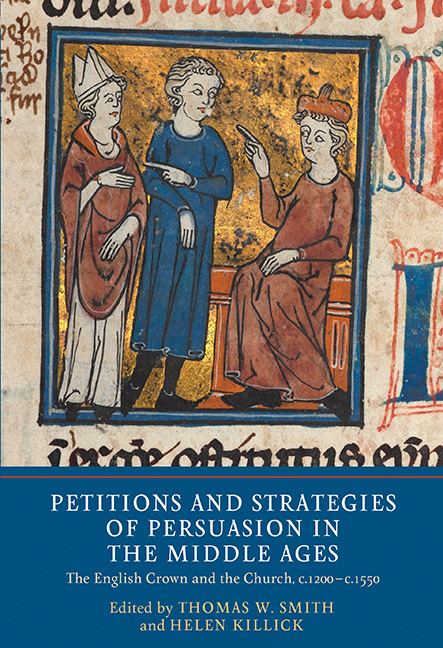 Petitions and Strategies of Persuasion in the Middle Ages
Petitions and Strategies of Persuasion in the Middle Ages Book contents
- Frontmatter
- Dedication
- Contents
- Contributors
- Foreword
- Acknowledgements
- List of Abbreviations
- Introduction: Medieval Petitions and Strategies of Persuasion
- 1 Blood, Brains and Bay-Windows: The Use of English in Fifteenth- Century Parliamentary Petitions
- 2 Petitioners for Royal Pardon in Fourteenth-Century England
- 3 The Scribes of Petitions in Late Medieval England
- 4 Patterns of Supplication and Litigation Strategies: Petitioning the Crown in the Fourteenth Century
- 5 Petitions of Conflict: The Bishop of Durham and Forfeitures of War, 1317–1333
- 6 A Tale of Two Abbots: Petitions for the Recovery of Churches in England by the Abbots of Jedburgh and Arbroath in 1328
- 7 ‘By Force and Arms’: Lay Invasion, the Writ de vi laica amovenda and Tensions of State and Church in the Thirteenth and Fourteenth Centuries
- 8 The Papacy, Petitioners and Benefices in Thirteenth-Century England
- 9 Playing the System: Marriage Litigation in the Fourteenth Century
- 10 Killer Clergy: How did Clerics Justify Homicide in Petitions to the Apostolic Penitentiary in the Late Middle Ages?
- Index
8 - The Papacy, Petitioners and Benefices in Thirteenth-Century England
Published online by Cambridge University Press: 20 August 2020
- Frontmatter
- Dedication
- Contents
- Contributors
- Foreword
- Acknowledgements
- List of Abbreviations
- Introduction: Medieval Petitions and Strategies of Persuasion
- 1 Blood, Brains and Bay-Windows: The Use of English in Fifteenth- Century Parliamentary Petitions
- 2 Petitioners for Royal Pardon in Fourteenth-Century England
- 3 The Scribes of Petitions in Late Medieval England
- 4 Patterns of Supplication and Litigation Strategies: Petitioning the Crown in the Fourteenth Century
- 5 Petitions of Conflict: The Bishop of Durham and Forfeitures of War, 1317–1333
- 6 A Tale of Two Abbots: Petitions for the Recovery of Churches in England by the Abbots of Jedburgh and Arbroath in 1328
- 7 ‘By Force and Arms’: Lay Invasion, the Writ de vi laica amovenda and Tensions of State and Church in the Thirteenth and Fourteenth Centuries
- 8 The Papacy, Petitioners and Benefices in Thirteenth-Century England
- 9 Playing the System: Marriage Litigation in the Fourteenth Century
- 10 Killer Clergy: How did Clerics Justify Homicide in Petitions to the Apostolic Penitentiary in the Late Middle Ages?
- Index
Summary
Where there are few jobs and many qualified applicants, there will be fierce competition. In the Middle Ages this manifested itself in the struggle for appointment to ecclesiastical benefices. Clerical candidates in want of a living fought bitterly against one another in order to acquire or defend possession of the fruits of churches throughout Christendom, and they employed an ingenious repertoire of legal strategies, tricks and deceptions in order to achieve their ends. The invention of papal provision in the twelfth century, and its widespread use throughout the West in the thirteenth century, was a disrupting influence which changed the face of this competition. Whereas candidates on the make had previously sought collation to Church positions through their local bishop, lay patron or the crown, from the thirteenth century they had a direct route to benefices through the papacy, which issued provision mandates to qualified clergy ordering their appointment to a suitable stipend. Papal provision brought with it advantages and disadvantages to the English clergy. It introduced one new method of appointment that levelled the playing field for those clerics who lacked the backing of a powerful prelate or lay patron, but it also brought with it new, Italian competitors for English benefices without increasing the number of such church livings available. Thus it intensified competition for benefices and also led to Italian immigration and the alienation of wealth from the English Church, which contemporaries such as Matthew Paris deplored. Modern scholars, following Matthew Paris, have tended to adopt a dim view of the papacy's intervention in the allocation of benefices across the face of the West, portraying it as an abuse of papal authority to intrude Italian favourites into far-away benefices. A more sensitive reading of the sources, however, reveals that papal intervention in the localities was far more complex than simple exploitation, and that the key period of expansion of the system in the thirteenth century was driven by native petitioners as well as papal kinsmen. The topic demands more detailed research if we hope to understand better this central aspect of the medieval Church. The present chapter goes some way towards this by exploring how petitioners made use of the papal supplicatory system as part of legal strategies to secure ecclesiastical benefices in thirteenth-century England, as well as how the papacy responded.
- Type
- Chapter
- Information
- Petitions and Strategies of Persuasion in the Middle AgesThe English Crown and the Church, c.1200–c.1550, pp. 164 - 184Publisher: Boydell & BrewerPrint publication year: 2018


